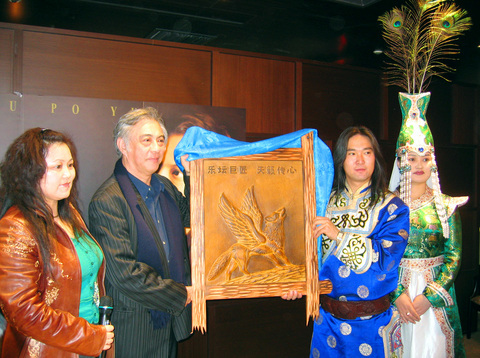Aailed as a pioneering promoter of the performing arts and music, 61-year-old Hsu Po-yun (
Few people know that Hsu is also an accomplished composer who has over 20 compositions to his name. Heart surgery earlier this year served as a wake-up call for Hsu, who decided to stop his management work and to pursue once again his life-long love affair with modern music.
The first step in his comeback is to hold a concert by several acclaimed musicians and conductors, who will present six of his modern compositions in one performance at the National Concert Hall (

PHOTO COURTESY OF JIN CHENG-CAI
Hsu's artistic career spans over 40 years, since he composed his first piece in the 1960s. Having dabbled with a formal classical training, Hsu taught himself and roams freely across the boundaries of traditional Chinese music and classical Western genres.
His highly conceptual approach to modern music has facilitated a long-term collaboration with Lin Hwai-min (林懷民).
His best-known piece The Pipa (
The Music of Hsu Po-yun (
"We have played [Hsu's] music for more than 10 years now, but the nuanced differences in tunes and velocity can lead to a different sphere of imagination and sensitivity each time we perform."
The quartet will present Hsu's A Meditation on Chinese Theater (
Tian Yuan can be seen as a musical expression of the artist's cosmological view. Starting from silence, the music slowly extends to pervade the whole space of the performance venue with seemingly infinite variations. Chen said that the complexity of the composition poses various technical difficulties and tests the skills and expertise of each performer.
The highlight of the concert is the last piece Mood, Field, Mind, Environment (
"It's a living composition. It varies and transforms each time a different artist from different cultural backgrounds infuses new life into the music," Hsu said.
Tonight, the piece will be performed by Ju Tzong-ching (朱宗慶), his Ju Percussion Group (朱宗慶打擊樂團) and two award-winning Mongolian vocalists Bao Yin Chao Ke Tu and Ao Deng Gerile from the Inner Mongolia Folk Arts Troupe (內蒙古民族曲藝團).
Asked why he chose khoomei music this time, Hsu talked about his passion for world music.
"I've been studying hundreds of kinds of world music, from Mongolia, Xinjiang and the Middle Asian regions for the past decade or so. The concert serves as the perfect chance to present the valuable cultural heritage cultivated over a period of thousands of years through modern music," he said.
To Hsu, the creation process doesn't stop at the completion of each piece.
"Unlike visual art, music can be recreated and transformed on multiple levels. First you, the composer, creates a piece, then each musician will have his or her own interpretation and approach to the music.
"The interaction between performers and the audience at concerts will lead the music to manifest itself in different ways and resonate with each participating individual's soul. Each performance of the music leaves in each participant an inner landscape that goes beyond the wildest imagination of the composer," Hsu said.
Performance notes:
What: The Music of Hsu Po-yun Where: National Concert Hall (國家音樂廳), 21-1, Zhongshan S Rd, Taipei (台北市中山南路21-1號)
When: Tonight at 7:30pm.
Tickets cost between NT$300 to NT$2,500, available through NTCH ticketing outlets nationwide, or at www.artsticket.com.tw

June 9 to June 15 A photo of two men riding trendy high-wheel Penny-Farthing bicycles past a Qing Dynasty gate aptly captures the essence of Taipei in 1897 — a newly colonized city on the cusp of great change. The Japanese began making significant modifications to the cityscape in 1899, tearing down Qing-era structures, widening boulevards and installing Western-style infrastructure and buildings. The photographer, Minosuke Imamura, only spent a year in Taiwan as a cartographer for the governor-general’s office, but he left behind a treasure trove of 130 images showing life at the onset of Japanese rule, spanning July 1897 to

One of the most important gripes that Taiwanese have about the Democratic Progressive Party (DPP) is that it has failed to deliver concretely on higher wages, housing prices and other bread-and-butter issues. The parallel complaint is that the DPP cares only about glamor issues, such as removing markers of Chinese Nationalist Party (KMT) colonialism by renaming them, or what the KMT codes as “de-Sinification.” Once again, as a critical election looms, the DPP is presenting evidence for that charge. The KMT was quick to jump on the recent proposal of the Ministry of the Interior (MOI) to rename roads that symbolize

On the evening of June 1, Control Yuan Secretary-General Lee Chun-yi (李俊俋) apologized and resigned in disgrace. His crime was instructing his driver to use a Control Yuan vehicle to transport his dog to a pet grooming salon. The Control Yuan is the government branch that investigates, audits and impeaches government officials for, among other things, misuse of government funds, so his misuse of a government vehicle was highly inappropriate. If this story were told to anyone living in the golden era of swaggering gangsters, flashy nouveau riche businessmen, and corrupt “black gold” politics of the 1980s and 1990s, they would have laughed.

It was just before 6am on a sunny November morning and I could hardly contain my excitement as I arrived at the wharf where I would catch the boat to one of Penghu’s most difficult-to-access islands, a trip that had been on my list for nearly a decade. Little did I know, my dream would soon be crushed. Unsure about which boat was heading to Huayu (花嶼), I found someone who appeared to be a local and asked if this was the right place to wait. “Oh, the boat to Huayu’s been canceled today,” she told me. I couldn’t believe my ears. Surely,